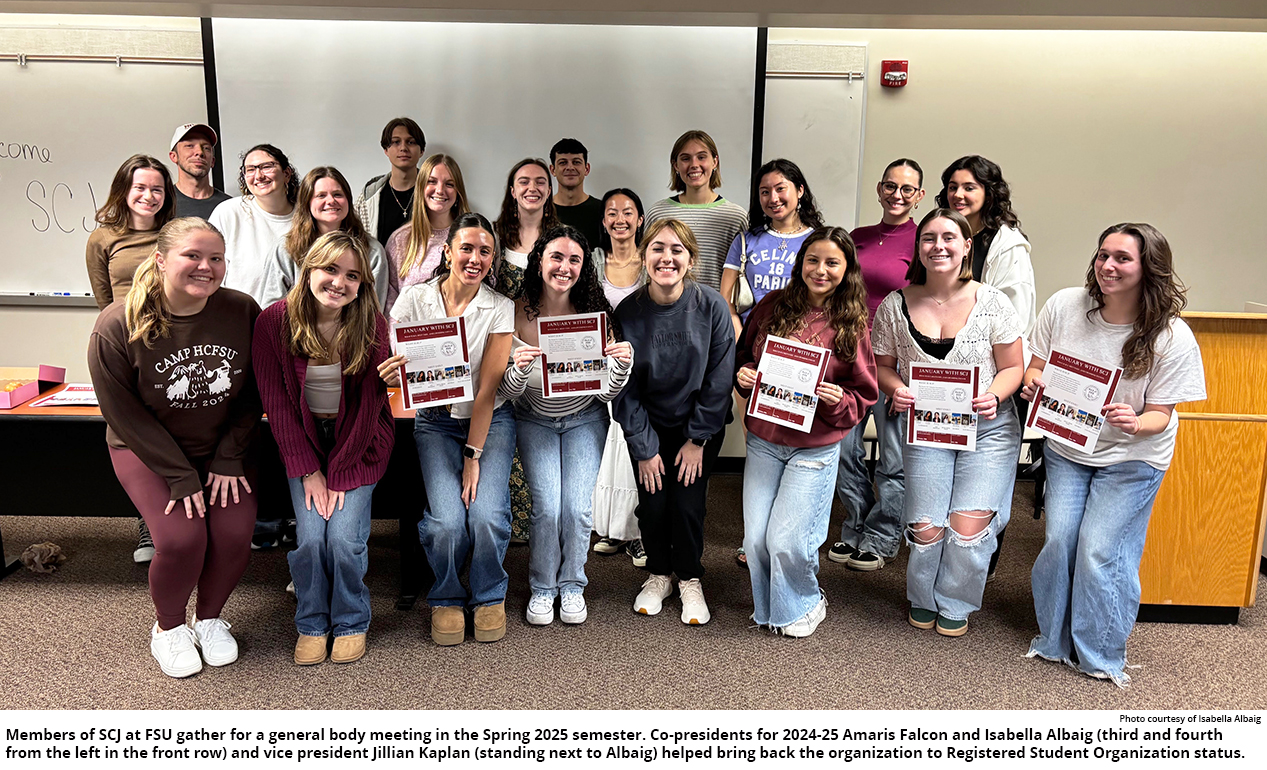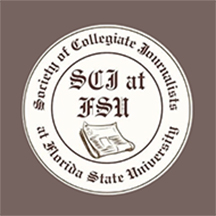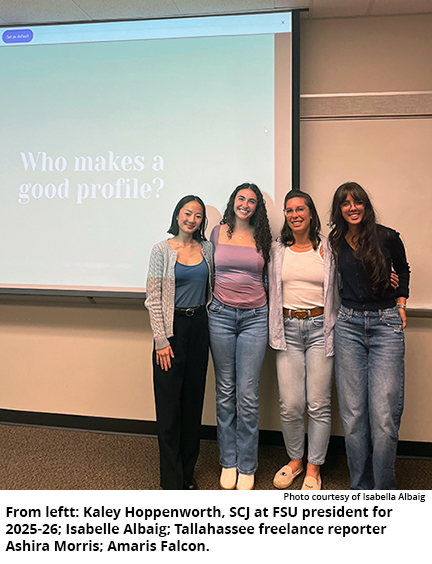FSU's Society for Collegiate Journalists provides students with space to learn from and to network with peers, professionals

By Emmie Klekamp
Three members of Florida State University’s chapter of the Society for Collegiate Journalists 2024-25 executive board recently graduated, but the work the leaders put into this established safe haven for student journalists will be felt for years to come.
Colloquially known as SCJ, the national Society for Collegiate Journalists was founded in 1975 and is the nation’s oldest honor society for student media leaders. Their mission is to provide a space for aspiring journalists to develop their skills within a supportive community.
FSU’s chapter first formed as a registered student organization in 2011 and was restarted in 2017 following a two-year hiatus. The COVID-19 pandemic affected SCJ’s RSO status, but the organization has now been formally revived and registered.
“The idealization of this whole organization is to help people get the opportunities and meet the people they wouldn’t have otherwise,” says Jillian Kaplan, SCJ’s vice president for 2024-25.
Kaplan graduated from FSU in Spring 2025 with a double major in English-Editing, Writing, and Media as well as media and communication studies. She is pursuing a career in journalism, and Kaplan cites her involvement with SCJ as a pivotal point in her academic journey.
 Isabella Albaig agrees with Kaplan’s description of SCJ, adding that the group acts as a home base for students interested in the field, saying it is a “learning organization.” Albaig and Amaris Falcon were co-presidents SCJ for 2024-25.
Isabella Albaig agrees with Kaplan’s description of SCJ, adding that the group acts as a home base for students interested in the field, saying it is a “learning organization.” Albaig and Amaris Falcon were co-presidents SCJ for 2024-25.
Albaig also graduated from FSU in Spring 2025, with dual degrees in English-Editing, Writing, and Media and in media and communication studies. She is traveling north to study in New York University’s journalism graduate program beginning in the fall of 2025.
“SCJ provides workshops, we provide networking opportunities, and professional connections,” Albaig says, explaining with enthusiasm SCJ’s focus.
Diving further, she says SCJ fills a special niche at FSU because the university lacks a journalism school. By facilitating a common space for students to grow together, SCJ “bridges the gap between the English major and the field,” Albaig says.
Falcon had her own unique experience as an FSU student and SCJ co-president, absorbing the skills that the organization cultivates while preparing for law school. Falcon graduated in Spring 2025 with majors in English-Editing, Writing, and Media and in media and communications studies, adding a minor in textile entrepreneurship. Falcon adds to the conversation and articulates that, in addition to filling that journalism gap, the vibrant amalgamation of passionate people made her time with SCJ so special.
“We wanted SCJ to be somewhere that we could become a journalism community, but also learn and engage and connect with each other,” she says.
Falcon adds that a bonus of being a part of the organization is that many members are involved in the news outlets across campus. For example, editors and writers of publications such as FSView & Florida Flambeau, Her Campus at FSU, and Strike Magazine joined together under SCJ’s umbrella.
Falcon, Albaig, and Kaplan all agree that SCJ creates a space for these creatives to collaborate without the pressures that are present with the fast-paced world of publishing.
“As fun and exciting as it is to engage with those news organizations, SCJ wants to be a place where you can just go to learn and connect,” Falcon says, adding that SCJ strives to “lift people up.”
While being mainly student-focused, Albaig, Falcon, and Kaplan worked together to launch events for both SJC members and the community. They planned writing workshops, hosted seasoned professionals to lead panels, and created a newsletter that showcases member’s works.
For example, in February 2025, Falcon and Albaig formed, in collaboration with Florida A&M University, Black Journalism Panel in honor of Black History Month, which Albaig moderated. SCJ also offered a profile-writing workshop with local freelance journalist Ashira Morris, and co-hosted with FSU’s English Honors Society a movie night in Cascades Park to engage FSU’s student body.
With these opportunities, SCJ operates as an educational resource for its members, helping them to develop a base from which to launch a successful career. The goal, Albaig says, is to encourage students to network vertically and to connect with individuals who are further along in their careers. She explains that it is just as important to connect horizontally with one’s peers, as those meetings can lead to opportunities for collaboration.
“You don’t know what connection they might have down the road,” Albaig says, adding that she values SCJ’s ability to “bring worlds together and give students opportunities to get a foot in the door.”
Kaplan eagerly agrees with this point: “Everyone’s kind of at the same level of trying to just kind of grow and meet new people.”
The three members of the executive board clearly expressed their appreciation for SCJ giving students a relaxing, open environment to find like-minded peers who are working toward similar goals. As they begin their post-FSU careers, Kaplan, Albaig, and Falcon encourage interested students to ignore any initial nerves they might feel and to contact the next leaders of SCJ.
“Reach out,” Falcon says. “SCJ is here for you as students, and we want to have that community and that relationship with everyone.”
The full SCJ executive board for 2024-25:
Co-President: Isabella Albaig
Co-President: Amaris Falcon
Vice President: Jillian Kaplan
Social Media Director: Gabriella Barroso
Historian: Michaela Galligan
Outreach Coordinator: Kaley Hoppenworth
The SCJ executive board for 2025-26:
President: Kaley Hoppenworth
Vice President: Michaela Galligan
Social Media Director: Gabriella Barroso
Treasurer: Anna Bullock
Secretary: Cameron Glyph
Outreach Coordinators: Sophia Bruener and Andrea Chouinard
Emmie Klekamp is a major in English-Editing, Writing, and Media, with a minor in communication.
Follow the English department on Instagram; on Facebook; and on X.
